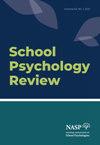呼吁以公平为中心的社会情感学习
IF 3
3区 心理学
Q1 Social Sciences
引用次数: 2
摘要
摘要我们目前在社会情感学习(SEL)课程中使用的方法并不能真正满足学生的需求。SEL项目已被证明在心理和社会福利的许多领域取得了成功,但未能达到促进社会温暖和人际关系的预期目标。文献表明,少数族裔学生一直报告他们对适合课堂环境的看法存在问题,这些看法对学术和社会结果有已知的负面影响。目前的SEL课程在很大程度上反映了白人、中产阶级、美国人的信仰和价值观,使剥夺选举权和边缘化的负面社会安排永久化。非常需要重新构建SEL课程开发,以消除这种多数人的影响,并鼓励学校利益相关者挑战现有的社会不平等。SEL课程有可能成为创建更公平的学校社区的关键要素,通过其参考框架和帮助学生和其他利益相关者发展的技能,更有效地解决歧视和偏见问题。还讨论了关于如何调整当前SEL课程的未来研究、可操作项目和建议。影响声明当前的社会-情感学习(SEL)继续延续压迫制度,未能满足我们少数族裔学生群体(黑人/土著/有色人种、LGBTQ+、残疾人、移民等)的需求。学校心理学家在帮助推动SEL的重点从“修复”个别学生的缺陷转移到关注影响整个课堂、学校和社区的社会环境和社会制度,以便更有效地满足少数族裔学生群体的需求。本文章由计算机程序翻译,如有差异,请以英文原文为准。
A Call for Equity-Focused Social-Emotional Learning
Abstract The approaches we are using presently with social–emotional learning (SEL) curricula are not truly meeting the needs of our students. SEL programs have proven successful in many areas of mental and social wellbeing but fall short of their intended goals of promoting social warmth and human relationships. The literature suggests that minoritized students consistently report issues with perceptions of fit in the classroom environment, and these perceptions have known negative effects on academic and social outcomes. Current SEL curricula largely reflect White, middle class, American beliefs and values, perpetuating the negative social arrangements of disenfranchisement and marginalization. There is a significant need to reframe SEL curriculum development to remove this majority influence and encourage school stakeholders to challenge existing social inequities. SEL curricula have the potential to be key elements in creating more equitable school communities by more effectively addressing discrimination and prejudice through their frames of reference and the skills they help students and other stakeholders develop. Future research, actionable items and recommendations regarding how to adapt current SEL curricula are also discussed. Impact Statement Current social–emotional learning (SEL) continues to perpetuate systems of oppression and fails to meet the needs of our minoritized student populations (Black/indigenous/people of color, LGBTQ+, dis/abled, immigrant, etc.). The school psychologist is integral in helping to facilitate the shift in the focus of SEL from “fixing” the deficits of individual students to focusing on the social contexts and social systems that affect the entire classroom, school, and community in order to more effectively meet the needs of minoritized student populations.
求助全文
通过发布文献求助,成功后即可免费获取论文全文。
去求助
来源期刊

School Psychology Review
Social Sciences-Education
CiteScore
6.90
自引率
20.00%
发文量
54
期刊介绍:
School Psychology Review (SPR) is a refereed journal published quarterly by NASP. Its primary purpose is to provide a means for communicating scholarly advances in research, training, and practice related to psychology and education, and specifically to school psychology. Of particular interest are articles presenting original, data-based research that can contribute to the development of innovative intervention and prevention strategies and the evaluation of these approaches. SPR presents important conceptual developments and empirical findings from a wide range of disciplines (e.g., educational, child clinical, pediatric, community.
 求助内容:
求助内容: 应助结果提醒方式:
应助结果提醒方式:


